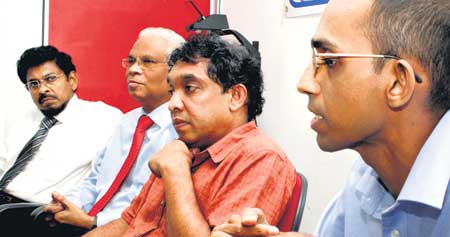
Traditional with hidden taxes
The 2008 budget drew a mixed bag of reactions during an exclusive panel discussion convened by The Sunday Times FT but the general consensus of the business community was that it’s a ‘traditional’ budget with hidden taxes. On the panel were President of the Ceylon National Chamber of Industries, A.K. Ratnarajah, Chairman of KIK Group Lalith Kahatapitiya, Dr Sirimal Abeyratne, Senior Economist at the University of Colombo and Channa Amaratunga, Chief Investment Officer of Boston Asset Management (Pvt) Ltd. (See Page 10 for extensive coverage on the discussion). Separately, Nimal Perera, Director Vallibel Holdings, told The Sunday Times FT that more than anything this is an ‘environmentally friendly budget’. He observed that the Conservation Levy Act will be introduced ensuring environment conservation where a permanent household, with a vehicle and a telephone and electricity connections will be liable to this environment levy of Rs. 20 per month through the Act. “I term it as such because there is much hype about the surroundings with a Rs. 20 charge rather than anything else that is tangible,” he noted. He warned that no foreign company will start business in the country because some of the proposals are very regressive. Perera noted that the current tax holidays granted under Inland Revenue Act or BOI Law is restricted to three years and that no further holiday period after the expiry of three years within the holiday is granted. “Also the budget says that every tax holiday must be approved by the Ministry of Finance. This way no one will invest here,” he added. In Parliament, President Mahinda Rajapaksa said the aim of the budget is to sustain 7% economic growth over the coming year. Oil prices, it was assured, won’t be increased in the near term with the VAT on petrol being reduced as a further incentive to bring down prices. Proposals also included strengthening the cooperative system giving protection to lower income groups where over 300 cooperative societies around the country will be linked with Lak Sathosa outlets. In order to promote the distribution of essential items at affordable prices, it was proposed to exempt cooperative societies from income tax, VAT, debit tax including withholding tax on interest for a five year period, rendering them tax free enterprises. There were various other tax related proposals in the budget. Ashok Pathirage, Chairman, Softlogic Group, reiterated that this budget is not a development oriented one. “There are no allocations for infrastructure projects. They are only being discussed,” he said. Pathirage commended the government for granting concessions to the healthcare sector. “Supply of all health care services by any medical institute which has entered into an agreement with the BOI under section 17 of the BOI Law, on or after April 1, 2001, where the total cost of the project to which such agreement relates to, is not less than US$ 10 million is exempt from tax,” he said. He also said that it is a progressive proposal to reduce Value Added Tax from 15 to five percent on capital items in the healthcare sector. “They have recognised the importance in investing in healthcare equipment,” he added. A top businessman said that the budget was an eye wash. “The country is on a major economic decline and the economy is mismanaged. This is the reality. Nothing significant will happen to the economy from this budget,” he said. He stressed that the budget needs to lay down important decisions to come out of the quagmire the country is going through. “There is nothing to grant an impetus to the business sector.” he noted. Sanjay Tiwari, Managing Director Ceylon Glass said that foreign professionals being taxed, is not very encouraging. “If they are also granted the same incentives as their local counterparts, it will be fair and equitable,” he said. A director of a top conglomerate described the budget as ‘disgraceful’. “It is a ridicules piece of paper. There is nothing conducive to the business sector and there are a lot of stealth taxes that are imposed in them,” he added. |
|
||
| || Front
Page | News
| Editorial
| Columns
| Sports
| Plus
| Financial
Times | International
| Mirror
| TV
Times | Funday Times || |
| |
Reproduction of articles permitted when used without any alterations to contents and the source. |
© Copyright
2007 | Wijeya
Newspapers Ltd.Colombo. Sri Lanka. All Rights Reserved. |
